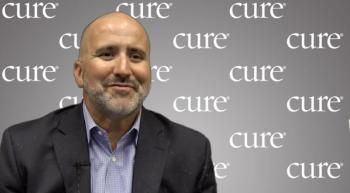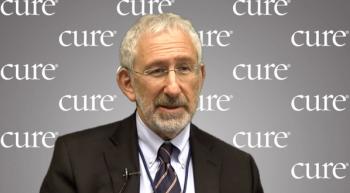
Audra Moran, president and CEO of the Ovarian Cancer Research Fund Alliance, discusses the support available for caregivers of women with ovarian cancer.

Audra Moran, president and CEO of the Ovarian Cancer Research Fund Alliance, discusses the support available for caregivers of women with ovarian cancer.

Investigators are learning how to take a tumor biopsy from a patient, grow small tumors called organoids in the lab, and test cancer treatments on them to see which work best.

Thanks to targeted drugs and evolving research, women who experience recurrences of ovarian cancer have more treatment options than they did in the past..

Saketh Guntupalli, M.D., gynecologic oncologist at the University of Colorado Hospital, discusses ways that women can improve intimacy after an ovarian cancer diagnosis.

The first thing a woman should do after receiving a diagnosis of ovarian cancer, according to Teresa P. Díaz-Montes, M.D., M.P.H., is nothing. At least not right away.

New treatments are continually being explored as researchers use genetic testing and genomic sequencing to better understand characteristics of ovarian cancer that can be targeted with drugs.

PARP inhibitors have made for new and exciting treatment options for ovarian cancer, but there is still much more work to be done, according to Dennis J. Slamon, M.D., Ph.D.

Adversity early on in life and increased stress levels could impact ovarian cancer outcomes – even if these instances happen before a woman is diagnosed, according to a recent article published in the journal Cancer.

Take a look at the top five CURE stories of June 2018 in this video.

PARP inhibitors continue to impress in the ovarian cancer space, as findings from the recent phase 3 SOLO-1 trial showed that Lynparza (olaparib) showed clinically-meaningful improvement in progression-free survival (PFS) when used in the first-line maintenance setting.

Folate receptor alpha was a promising biomarker when it came to treatment with mirvetuximab soravtansine.

A recent review of data found that 79 percent of patients with ovarian cancer felt uncomfortable raising psychological and emotional concerns during their consultations.

In the QUADRA study, treatment with Zejula (niraparib) demonstrated durable responses among women with relapsed or refractory ovarian cancer, regardless of BRCA mutation.

Lynch syndrome – a hereditary condition that increases a person’s risk for developing several types of cancer – is common among people with microsatellite instability-high (MSI-H) tumors, linking it to several new cancer types, according to large genomic study results presented at the 2018 American Society of Clinical Oncology (ASCO) Annual Meeting.

The Food and Drug Administration approved a combination of Avastin (bevacizumab) plus the chemotherapy agents carboplatin and paclitaxel, followed by Avastin alone, for the treatment of patients with advanced ovarian cancer who have had surgical resection.

The FDA approved the Paxman Scalp Cooling System for patients with solid tumors who wish to prevent chemotherapy-related hair loss.

Although genetic testing could be crucial in developing treatment plans and improving outcomes in women with ovarian and breast cancer, less than 20 percent of eligible patients actually get tested, according to Mike Janicek, M.D.

The field of ovarian cancer is changing rapidly, and moving toward an era of precision medicine.


While many advocacy groups set out to raise money for cancer research, a first-of-its-kind charitable crowdfunding platform, called Sound Affects, has set out to change how the war on cancer is fought and financed, all with support from musical talents.

There are now three PARP inhibitors approved for the treatment of ovarian cancer, improving outcomes of many of the women who take them.

Paradigms are shifting in the way that ovarian cancer is being treated.

Memorial Day has multiple meanings for this cancer survivor.

Survivors teach medical and nursing students around the world about early disease signs and symptoms.

Girls Gone Rx sponsors all-female fitness competitions to raise money for Bright Pink, a nonprofit that focuses on prevention and early detection of breast and ovarian cancer.